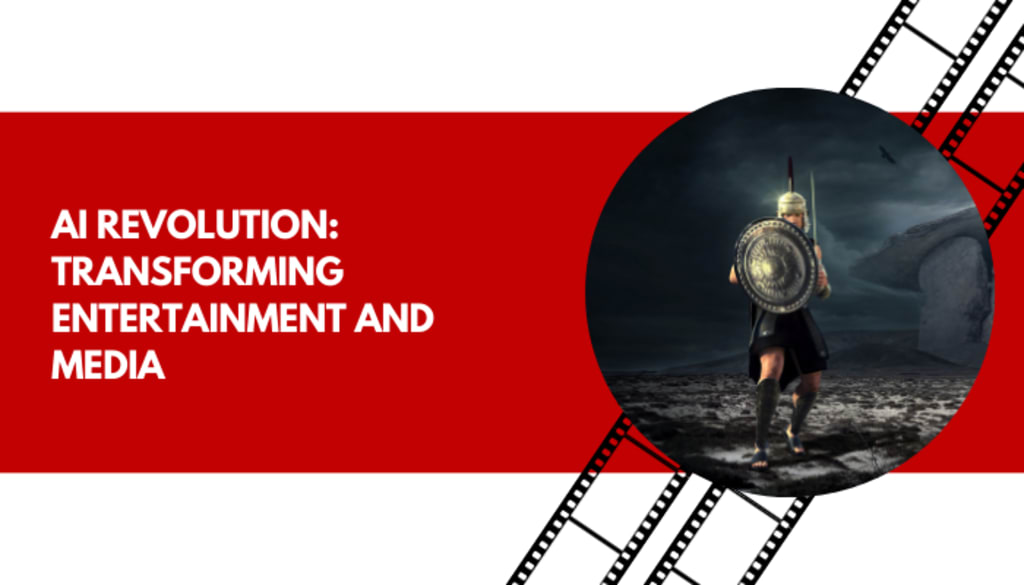AI Revolution: Transforming Entertainment and Media
Exploring the Intersection of Artificial Intelligence and Creative Expression in Modern Media

The entertainment industry, a realm traditionally driven by human creativity and talent, is currently undergoing a significant transformation. This change is largely fueled by the advent and integration of artificial intelligence (AI). The term "entertainment AI" has become a buzzword, symbolizing the groundbreaking shift in how content is created, distributed, and consumed. In this blog, we'll delve into the various facets of this revolution, exploring how AI is not just an add-on but a game changer in the entertainment and media industry.
The Dawn of a New Creative Partner
At the core of the entertainment industry is creativity. Traditionally, this creativity stemmed exclusively from human minds, but today, AI is emerging as a new kind of creative partner. Scriptwriting, for instance, has seen AI algorithms suggest plot twists, character developments, and even entire story arcs based on audience preferences and past successes. This doesn't imply that AI is replacing human creativity but rather enhancing it, offering new perspectives and ideas that might not occur in a typical writer's room.
Personalization: The New Normal
Personalization is perhaps the most evident impact of AI in entertainment. Streaming services like Netflix and Spotify use AI to analyze vast amounts of data on user preferences, viewing habits, and listening history. This analysis leads to highly personalized recommendations, ensuring that users are more likely to find content they'll enjoy. The result is not just a better user experience but also increased engagement and loyalty, vital metrics in the highly competitive entertainment sector.
Revolutionizing Animation and Visual Effects
AI's impact is also profoundly felt in animation and visual effects, areas traditionally requiring extensive human labor and time. AI algorithms can now animate complex scenes in a fraction of the time it would take human animators, often with stunning detail that can even challenge the limits of human capability. This efficiency doesn't just save time and money; it also opens the door for smaller studios to create high-quality content that was previously beyond their reach.
Enhancing Music Production
In music production, "entertainment AI" is not just a tool for recommendations but also for creation. AI algorithms can compose music, generate unique sounds, and even perform in ways that mimic human artists. While the debate about the soul and originality of AI-generated music continues, it's undeniable that AI offers tools that can inspire and assist musicians in their creative processes.
The Emergence of Virtual Celebrities and Influencers
Virtual celebrities and influencers, powered by AI, are now becoming part of the entertainment landscape. These digital personas, like Lil Miquela or virtual K-pop stars, attract real followings and interact with fans just like human celebrities. This phenomenon is not just a novelty; it reflects a deeper integration of AI into the fabric of social interaction and entertainment.
AI in Film Editing and Cinematography
AI's role extends into film editing and cinematography, where it can analyze and suggest edits, manage color grading, and even assist in camera angle selection, all based on the desired mood and narrative flow of a piece. This AI assistance can significantly streamline the post-production process, allowing filmmakers to focus on the more creative aspects of their work.
The Role of AI in Gaming
The gaming industry has been one of the early adopters of AI. From creating more realistic and responsive non-player characters (NPCs) to designing entire game worlds, AI is an integral part of modern game development. AI algorithms are also used to test games before release, predicting player behavior and ensuring a more engaging gaming experience.
Challenges and Ethical Considerations
Despite the numerous benefits, the integration of AI in entertainment and media is not without challenges. There are concerns about job displacement, especially in areas where AI proves more efficient than human labor. Additionally, the ethical implications of AI-generated content, such as deepfakes and the potential for misinformation, cannot be ignored.
The Future of AI in Entertainment
Looking ahead, AI is poised to become even more ingrained in the entertainment industry. With advancements in AI technology, we can expect even more personalized content, innovative forms of entertainment, and perhaps new genres that blend AI and human creativity in ways we have yet to imagine.
Conclusion
The "AI Revolution" in the entertainment and media industry is just beginning. As AI technology continues to evolve, so will its applications in this sector. From enhancing creativity to personalizing experiences and opening new frontiers of entertainment, AI is not just a supporting actor but a leading force in reshaping this vibrant industry. The key to harnessing its full potential will lie in finding the right balance between technological possibilities and human creativity, ethics, and insight.





Comments
There are no comments for this story
Be the first to respond and start the conversation.